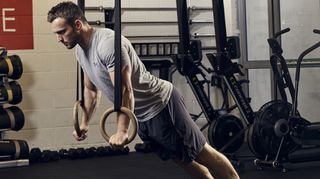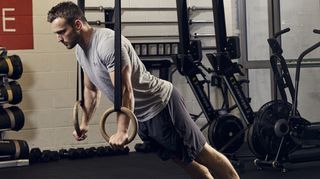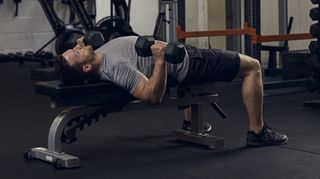5 Chest Exercises That Are Better Than The Bench Press
Build size in your upper-body with these powerful moves

We know we risk being banned from every half-decent gym in the land by saying this, but it’s time to admit it: the bench press isn’t all it’s cracked up to be. In fact, it’s little more than a big lift that builds a big ego, and it does relatively little to build a more muscular chest.
Don’t get us wrong: when it’s used in a progressive and balanced training plan, the bench press definitely makes a helpful contribution. But far too many guys focus their chest sessions on using – or waiting for – a bench and barbell. As we reveal below, there are better moves for sculpting impressive pecs that also minimise your chance of injury (or getting stuck under a bar). So start to include these other moves instead and watch your chest expand.
1. For Bonus Abs Work: Ring Press-Up

Why: Rings aren’t just for the gym show-offs. According to a 2014 study published in the Journal Of Strength And Conditioning Research, doing press-ups on a suspension trainer leads to increased muscle activation in the abs, delts and pectoral muscles.
How: Start with your feet on the floor, at an angle that’ll let you get a few reps done. Brace your core and glutes to keep your body in a straight line. Once you start to “caterpillar”, stop the set. “Once you can do a handful of reps, move to elevating your feet to the same level as your hands,” says trainer Adam Wakefield. “Then add a weight vest to make it tougher.”
For Go-Anywhere Gains: Band Press-Up
Why: Once you can do more than a dozen strict press-ups, you’re mainly working on muscular endurance, not building muscle. Using a band adds resistance, and a 2015 study found that band press-ups at similar levels of exertion to a bench press produced similar gains. Work your pecs at home with a heavy band (£8.99, wolverson-fitness.co.uk).
How: Wrap the band around your back and grip the ends. Keep your hands slightly below shoulder level to protect your shoulders and lead to better muscle activation. Three sets to near failure, twice a week, will set you on the road to strength.
For Healthy Shoulders: Floor Press
Why: No bench required. Also, if you have shoulder or elbow pain from benching, the floor press automatically corrects your form while reducing leg drive so there’s more triceps focus.
Get the Coach Newsletter
Sign up for workout ideas, training advice, reviews of the latest gear and more.
How: Start by going one-armed – as well as being able to manoeuvre the dumbbell into place more easily, you’ll engage your core to stabilise the weight. If you’re ready to graduate to the two-arm version, use a moderate weight for high reps: lower it until your triceps touch the floor, then press up. To really engage your chest, squeeze the dumbbells together as you press, then switch to normal floor presses when you hit failure.
For Maximum Pec Activation: Earthquake Flye
Why: Yes, it takes some setting up – and you might get odd looks – but the flye is a better chest-builder than the bench, and this is its ultimate form. “Adding resistance bands to kettlebell flyes will make your chest work harder in order to stabilise the weights,” says Wakefield. “It’ll build a chest to treasure.”
How: Grab a pair of kettlebells – start with the 12s – and wrap resistance bands around the handles. Lying on a slight incline, bring them overhead in a flye motion, then lower. “Keep the movement very slow and controlled,” says Wakefield. “Superset ten of these with ten ring press-ups for a killer chest workout.”
For T-Shirt Muscle: Dumbbell Bench

Why: Technically, the main function of the pec muscles during pressing exercises is “transverse adduction”, or bringing the arms towards the centre of the body. Obviously, during a barbell bench press, your hands can’t move inwards, so the alternative is the dumbbell version, which offers higher pec activation and a greater range of motion.
How: For best results, let your hands go below chest level at the bottom of the move and then bring the dumbbells together at the top when your arms are straight. If you’ve experienced shoulder issues, use a neutral grip, which means palms facing inwards.
From 2008 to 2018, Joel worked for Men's Fitness, which predated, and then shared a website with, Coach. Though he spent years running the hills of Bath, he’s since ditched his trainers for a succession of Converse high-tops, since they’re better suited to his love of pulling vans, lifting cars, and hefting logs in a succession of strongman competitions.

